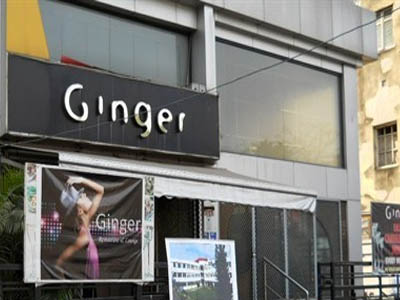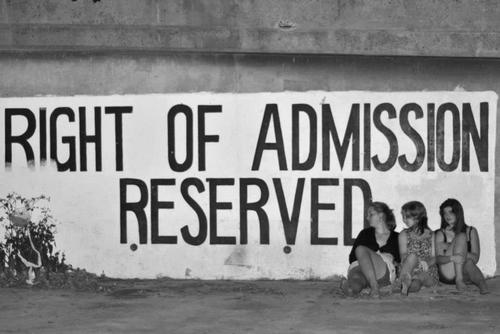This article was written by Vaibhav Raaj, a PhD Candidate at JNU.
Reserving the Right to Admission for Moral Convenience
A couple of days back the Park Street rape survivor with a lesser known name, Suzette Jordan, was denied entry in a Kolkata restaurant. She claims that she was explicitly identified as a rape victim in public view, humiliated and turned away. The management of the restaurant has unapologetically denied her version of the events and argued that they reserve the “right to admission” to the privately-owned eatery. This “right to admission reserved” clause has been the neon-lit signpost of the active hostility of the hospitality industry towards vast sections of socially marginalized people. It is common practice in Indian restaurants and hotels to restrict entry on grounds of attire, conduct, suspicion of prostitution or any other demeanour or appearance of a potential customer which can inconvenience the regular clientele. And here lies the catch. The convenience and well-being of its customers may be a genuine concern, the problem arises when a certain category of people by their very existence are presumed to be an affront to the moral or simply the aesthetic preferences of the rest of the society. The denial of service to Ms. Jordan was to avoid such “moral/aesthetic” inconvenience to the customers of Ginger Restaurant in Kalighat, Kolkata.
The “right to admission” clause in the hospitality industry is understood as a guard against situations where allowing a particular customer inside the premises would most likely irk the other patrons. For instance someone known to get into drunken brawls, indulge in obscene behavior or a known sexual harasser can be denied entry for the good of the other customers. If this vigilance is not maintained the restaurant in question can be sued for “deliberate negligence with criminal abetment” and for “deficiency in service” besides for “damages” to untold extents.
However it is common knowledge that the “right to admission reserved” clause is used by restaurants, hotels, pubs, bars and such private service providers for all kinds of purposes- maintaining a niche profile of their regular clientele based on their class, ethnicity, gender, culture, language, dressing style, mannerisms, sexual orientation and even religion. In Delhi for instance many restaurants and pubs would turn you away if you go in slippers. You cannot easily book a room in a hotel with a companion of opposite gender. In many places in Kolkata, women are not served more than two drinks if they do not have a male companion. Bars and restaurants in smaller towns simply refuse entry to women.
Not a Consumer without Admission
If you are denied entry into the premises of the service provider, you automatically are precluded from the cover of the Consumer Protection Act. The Consumer Protection Act recognizes you as a consumer only after you have availed the services of a restaurant or any other business in question. Even if you are granted entry and service, the management can at any point eject you from the place without citing any specific reason. The Consumer Forum is highly unlikely to interject in such a scenario.
What happened to our civil rights?
The Protection of Civil Rights Act can be invoked if a restaurant or business denies you entry citing your Scheduled Caste identity. Such continuance of the abhorrent practice of unctouchability is explicitly forbidden under the Civil Rights Act. The SC/ST Prevention of Atrocities Act can also be invoked in such cases of blatant casteist practices. The Physically/Visually Handicapped (PH/VH) persons have also received some attention in the revised rules of licensing of hotels and restaurants. Establishments are required to be disabled-friendly and they cannot deny service to such persons on the grounds of their disability. Both these categories, dalits and PH/VH have won these legal rights through sustained political and social struggles.
However similar protection is not available to the other categories of women, LGBT, foreign nationals particularly of African origin, Muslims and other religious minorities, elderly persons, etc. A restaurant can simply choose to not admit or place heavy restrictions on the admission of these categories legally. There is no recourse available to these categories under the Indian law. The atrocity on Ms. Jordan reminds us that these unfortunate categories of legally discriminated persons also include rape survivors.
Rape Survivors as a discriminated category
Every year India witnesses more than 50000 rapes that are brought to the notice of the law enforcement. As most rape cases go unreported due to the fear of social stigma, the actual number is definitely manifold of the number of reported incidents. This means that our society is home to millions of rape survivors who are doing everything in their power to overcome the trauma and lead a normal life. However it is people like the manager of Ginger restaurant who make their rehabilitation impossible. Such instances of social ostracization are unfortunately very common and have led to countless suicides by innocent persons who managed to survive rape but not our society. People fail to see rape as an act of violence by a dominant gender over the female (or other) body. In the wake of the Nirbhaya tragedy, the Centre issued directives to schools and colleges to not discriminate against rape survivors. Probably a similar directive could now be issued to restaurants, hotels, etc. in the wake of the Ginger incident. However such piecemeal measures can only bring temporary relief.
“Indians and dogs not allowed”
Most of the licensing rules for ‘places of public entertainment’ still follow the outdated laws of the colonial era. The motivation of such laws was to restrict the access of Indians, particularly those from deprived social backgrounds, to public spaces. It is tragic that most of the present statues regulating issues of creation of and access to public spaces are mere derivatives of the colonial laws and practices. Therefore it is not a surprise that most of them fall short in addressing the grievances of a majority of the society.
Jordan is not alone
The recent popular movement against sexual violence has shown how public pressure can lead to progressive revisions in colonial statutes. We are no more limited by temporal and spatial boundaries in the age of the internet. Ginger Restaurant’s page on zomato.com is witness to a nationwide outrage against the management of the restaurant for having denied entry to a rape survivor. More than 400 people have voiced their anger in the review section since Monday morning. In a single day, the rating of the restaurant dipped from a respectable 3+ to a pathetic under 2. If the owners of Ginger are in their right minds, they must have learnt the lesson. If the law failed to offer a precedent for the rights of Ms Jordan, we know now that her tragedy has been registered as one in the public mind.
In bringing to light the deficiencies of the law in dealing with incidents like yesterday’s we are hoping to start a conversation. The Consumer Protection Act and the licensing regulations are in dire need for revision to include provisions against the various discriminatory practices of the hospitality industry. Also perhaps it is time that the Protection of Civil Rights Act expanded its scope to cover the grievances of more categories. We know that Ms. Jordan is not the only one who was turned away from a public place feeling humiliated and helpless. Do share your own experiences in the comments section below. As these experiences shape our collective conscience we will hopefully push the state to become a more reliable guarantor of our civil rights! And we hope that the hospitality industry would become more sensitive to the plight of the vulnerable sections of our society.
 Serato DJ Crack 2025Serato DJ PRO Crack
Serato DJ Crack 2025Serato DJ PRO Crack











 Allow notifications
Allow notifications



The more we try to flush out the degraded perception of society towards rape survivors which is seen in the headless statements and theories coined by various people of social stature yet another irksome instance blow up.The act of not allowing a person who was already inhumanly treated makes all efforts of humanization of society fall flat on their mouth, here I did not use word women empowerment or vindication instead I use humanization as women deserve to be treated as human at first place. The idea is degeneration of a human may lead to endangering effects.
The social and fundamental rights modified and interpreted in these decades since independence , various cases , acts passed to facilitate citizens of this country to live life with dignity seeks its existence every time such acts come into ears.It is more or less social insensitivity and discriminatory attitude that makes life of survivors not just difficult but depressing .